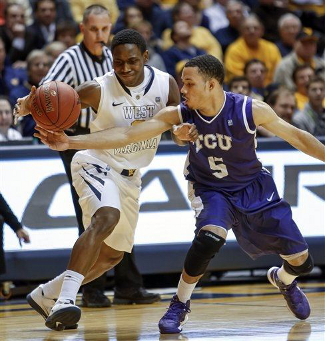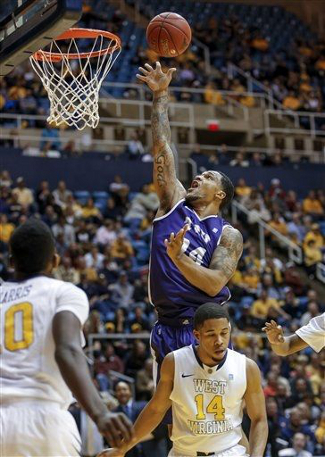Erwin Center | Austin, TX | Tip: 7 P.M. CT | TV: Longhorn Network LRT Consecutive Game #241 On Wednesday, the Texas Longhorns suffered their worst loss in more than seven years, as they were blown out by 26 points at Bramlage Coliseum. Texas posted its second-worst defensive performance of the year, allowing Kansas State to score 1.268 points per possession, well above the team’s season average of 0.885 points allowed. It was a demoralizing loss in every facet of the game, as the Wildcats out-hustled Texas to loose balls, forced turnovers, and scored at will for the entire 40 minutes. Fortunately, the Longhorns should be able to quickly put that loss behind them. TCU comes to town tonight for the first meeting in five years between these former Southwest Conference rivals, currently riding a seven-game losing streak. The Horned Frogs and first-year coach Trent Johnson have suffered through terrible luck in the injury department and are still looking for their first conference win in the Big 12. Texas could not ask for a better opponent to face when in dire need of a bounce-back performance. By the numbers Folks who have complained about their inability to watch the Longhorn Network might be thankful for the lack of carriage tonight. Both TCU and Texas struggle to score, while both teams also have strong defenses. Add in the fact that the Horned Frogs play at the 15th-slowest pace in all of Division I hoops, and the points could be few and far between in this one. TCU’s adjusted offensive efficiency is ranked an abysmal 329th out of 347 teams in D-I. The Horned Frogs score an adjusted 0.867 points per possession, with that number dipping even further in conference play. Against Big 12 opponents, the Frogs have managed just 0.804 points per possession, and they have posted a league-worst 38.6% effective field goal percentage. Making those scoring problems even worse are TCU’s struggles to hold on to the ball and to convert their freebies. The Frogs have coughed it up on 22.5% of their possessions and have made only 60.2% of their free throws. That percentage at the line is 10th-worst in Division I, which should help a foul-prone Texas defense tonight. The Longhorns send their opponents to the line more than any other team in Big 12 play, so they have to hope that TCU continues leaving points at the charity stripe. Defensively, the Horned Frogs have performed admirably, although their numbers are helped out quite a bit by a very weak non-conference schedule. TCU faced only one team ranked in the Top 100 by Ken Pomeroy, and played only one other that ranked in the Top 150. Since shifting to league competition, the Horned Frogs have allowed 1.057 points per possession, ninth-best in the conference. The tempo-free areas where TCU has excelled defensively are turnover percentage and free-throw rate. The Frogs have forced Big 12 opponents to turn it over on 22.6% of their possessions, the best rate in the league. Their FTR is second-best in the Big 12, as they give up roughly one free throw for every four field-goal attempts. Meet the Horned Frogs The Horned Frogs seemed to be heading in the right direction at the end of Jim Christian’s tenure, pulling off big home upsets over UNLV and New Mexico last year. Although they lost three key players from last year’s team, a lot of promising young talent and a solid recruiting class gave TCU fans a reason to be excited heading into their first Big 12 season. But, thanks to a rash of injuries, Coach Johnson has been forced to shift his rotation all season long, and he’s rolled out nine different starting lineups this year. Big man Aaron Durley (No. 44), who had originally committed to Marquette, was lost for the year after suffering a knee injury in pre-season workouts. Expectations were also high for Amric Fields (No. 4), who was the Sixth Man of the Year in the Mountain West last season. Unfortunately, he also suffered a knee injury just minutes into the third game of the season. As if those setbacks weren’t enough, the Horned Frogs also lost Jarvis Ray (No. 1) for six to eight weeks after he injured his foot in a non-con win over Southern.
Kyan Anderson has quick hands on the perimeter With so many key contributors lost, even more pressure has fallen on the shoulders of sophomore point guard Kyan Anderson (No. 5). Tabbed Freshman of the Year in the Mountain West last season, Anderson has started all 20 games for the Horned Frogs this year and has an impressive assist rate of 26.9%. He is the team’s only consistent three-point shooter, as he sinks 35.9% of his looks and averages nearly four attempts per game. Anderson’s 11.6 points per game are tops on the team, and his 3.1% steal rate ranks just outside the Top 300 nationally. Most impressively, Anderson logs those steals without drawing whistles, as he has been called for just 1.7 fouls per 40 minutes. The only other Frog to start in every game is senior forward Garlon Green (No. 33). He has shown some nice post moves on the block, but also has a solid mid-range game and accuracy beyond the three-point line. Although he averages just under two attempts from long range per game, Green has connected on 38.9% of those shots. One area of Green’s game that is frustrating is his work on the offensive glass. In the loss to Iowa State, his ability to extend possessions with offensive rebounds and get easy second-chance points were a key to TCU staying competitive with the Cyclones. But on the season, Green’s offensive rebounding percentage is a paltry 3.9%. If the 6’7″ senior would fight more consistently for boards on that end of the court, the Horned Frogs could be much more competitive in the Big 12. One man who is rebounding consistently is fellow senior Adrick McKinney (No. 24). A hometown kid who played at Trimble Tech High, McKinney is ranked just outside of the Top 100 nationally in both offensive and defensive rebounding percentage. McKinney snags 12.6% of his opportunities on the offensive end, while reclaiming 22% of opponents’ misses on the other end.
Adrick McKinney is a key contributor inside McKinney is a handful inside, but most opponents have made him work for his points. The senior makes just 53.4% of his free throws, which is why defenses have no problem fouling him when he gets the ball in good position down low. McKinney’s free-throw rate of 71.5% — meaning he takes roughly seven free throws for every ten field goal tries — underscores that problem. For a Texas team that has struggled defending the post since Jonathan Holmes’ injury, this is a welcome development. As long as the Horns make their post fouls count and don’t allow and-one opportunities, they can limit McKinney’s effectiveness by sending him to the stripe. The other big man for TCU is sophomore Devonta Abron (No. 23), who hails from Seagoville outside of Dallas. A transfer from Arkansas, he was given a waiver and allowed to play immediately due to an ill family member. Like McKinney, Abron struggles at the line, and opponents send him there often. His free-throw rate is an even 70%, while he actually makes just 52.4% of his attempts from the stripe. At 6’8″ and 255 pounds, Abron is a presence in the lane. His 4.6% block percentage is tops on the team and averages out to roughly one block per game. He’s ranked in the Top 250 nationally in both offensive and defensive rebounding percentages and has increased his playing time to more than 24 minutes per game in Big 12 contests. Abron still has great strides to make offensively, but he’s certainly developed quite a bit in his short time with TCU. Freshman guard Charles Hill, Jr. (No. 0) is currently the flavor of the month for that fifth starting spot, having surged onto the scene in conference play. After averaging just 2.2 minutes per game in non-conference games, Hill has started five of seven Big 12 games and is averaging more than 26 minutes against Big 12 foes. The freshman is an aggressive guard with great slashing skills, and that driving ability really opens things up for an offense that can become very stagnant at times. Unfortunately, he has struggled to actually put the ball in the basket, sinking less than 30% of his shots on the year. Until he proves that he can hit a midrange jumper or consistently knock down the triple, defenses can sag off of him and take away that driving threat. Senior guard Nate Butler Lind (No. 21) has also started five games in Big 12 play, but has logged eleven starts on the year. He also brings dribble penetration to the table, but has been marginally more consistent than Hill when it comes to knocking down the midrange jumper. Like Hill, he also has not made enough threes to warrant tight defense, so that hampers his ability to put it on the floor and get to the paint. The final player of TCU’s core rotation is 6’7″ forward Connell Crossland (No. 2). A juco transfer from Logan College, he has been a solid rebounder off the bench and is averaging 21 minutes per game. He nearly logged a double-double in the team’s Big 12 debut, snagging nine boards to go with eight points. Crossland has continued to impress in conference play, ranking second on the team with five boards per game. He’s also turned it up on the offensive end, averaging 11.5 points in the team’s last two games against Baylor and West Viginia. Keys to the game 1) Take advantage on the glass – Texas has struggled all season to secure defensive rebounds, and that problem has only become worse with the absence of Holmes. Texas Tech reclaimed 48.6% of their missed shots, while the Wildcats grabbed 40% of their misses on Wednesday night. TCU is a very average rebounding team that has a tough time making shots. If Texas can actually take advantage of that weakness on the glass and hold the Frogs to mostly one-shot possessions, the Longhorns should have no trouble tonight. 2) Take care of the ball – One area where the Frogs do find success is in forcing mistakes on the defensive end. Ball control has been a recurring problem for Texas, and those problems resurfaced in that ugly loss to K-State. The Longhorns ended 27.5% of their possessions with a turnover, and simply cannot afford to do the same against TCU tonight. The Horned Frogs are going to try to make this a low-possession game, so each and every mistake will be magnified. 3) Speed up the Frogs – One way to avoid a low-possession game with highly-leveraged possessions is to force TCU to speed things up. The Frogs were able to hang with Iowa State for about 15 minutes when they matched the up-tempo approach of the Cyclones, but ultimately made too many mistakes and couldn’t play good transition defense. Meanwhile, Texas showed that it was willing to throw out some pressure against Texas Tech last Saturday in an effort to speed up the Red Raiders. The Horns would be wise to try that same approach with the Frogs at random times tonight, not only making TCU uncomfortable on offense, but also hopefully contributing to some easy fast break points for Texas. |










